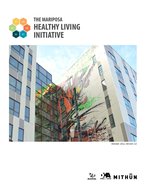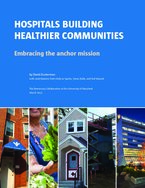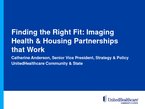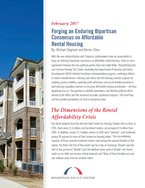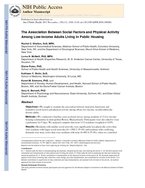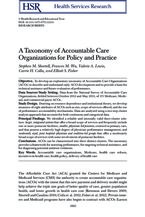Found 283 resources.
0
0
0
The Mariposa Healthy Living Initiative began in 2009, when the Denver Housing Authority and its master planning team established physical, mental, and community health as a proxy to understand how redevelopment actions would change the quality of life for residents. The Initiative recognizes that the built environment is a determinant of health outcomes, which ultimately influence the quality and length of life for residents. The Initiative uses a responsive and rigorous approach to address environmental and social determinants of health, which include Healthy Housing, Environmental...
Topics: Housing, Low-income, Partnerships, Place-based, Preventative care, Research, Safety, Transportation, West Coast
 Shared by Housing Is
on Jul 17, 2018
Shared by Housing Is
on Jul 17, 2018 0
0
0
The South Lincoln Health Impact Assessment (HIA) focuses on the redevelopment master plan for the Denver Housing Authority’s South Lincoln Homes community in downtown Denver. The rapid HIA and masterplan was a four-month process that began in April 2009. The HIA identifies potential health impacts and recommends changes to optimize positive and minimize negative health consequences for the South Lincoln neighborhood. This assessment includes community demographic and socioeconomic information, identified potential health issues, interviews available surveys, and limited body measurement data...
Topics: Child welfare, Community development, Disabilities, Dual-generation, Health, Housing, Low-income, Mental health, Metrics, Nutrition, Preventative care, Research, Safety
 Shared by Housing Is
on Jul 17, 2018
Shared by Housing Is
on Jul 17, 2018 0
0
0
Hospitals Building Healthier Communities aims to provide a resource for hospitals considering adopting or further integrating community engagement and economic development into their daily operations and their core mission.
Topics: Community development, Data sharing, Health, Housing, Low-income, Partnerships, Place-based, Research
 Shared by Housing Is
on Jul 13, 2018
Shared by Housing Is
on Jul 13, 2018 0
0
0
Recognizing the layers to developing a health and housing partnership, this Literature Review and Resource Bank is intended to provide background and data resources that can be used in grant applications or in conversations with potential funders in the effort to foster new health and supportive housing partnerships.
Topics: Cost effectiveness, Criminal justice, Data sharing, Dual-eligibles, Funding, Health, Homelessness, Housing, Low-income, Medicaid / Medicare, Mental health, Partnerships, Post-secondary, Preventative care, Research, Seniors, Substance abuse, Supportive housing, Youth
 Shared by Housing Is
on Jul 13, 2018
Shared by Housing Is
on Jul 13, 2018 0
0
0
Topics: CLPHA, Data sharing, Health, Housing, Legislation & Policy, Low-income, Medicaid / Medicare, Partnerships, Preventative care, Research
 Shared by Housing Is
on Jul 13, 2018
Shared by Housing Is
on Jul 13, 2018 0
0
0
This brief aims to bring attention to non-Medicaid funding sources that states could potentially blend or braid to address social determinants of health and other needs that are not typically covered by Medicaid. It is intended to familiarize state Medicaid, public health, and other state policymakers with the funding streams of other agencies, and sketch out a continuum of options to help states coordinate funding to better serve the needs of low-income populations. Because this brief focuses on services for adult Medicaid beneficiaries, it does not address many of the funding sources...
Topics: Cost effectiveness, Data sharing, Dual-eligibles, Food insecurity, Funding, Health, Homelessness, Housing, Legislation & Policy, Low-income, Medicaid / Medicare, Mental health, Partnerships, Research, Substance abuse
 Shared by Housing Is
on Jul 12, 2018
Shared by Housing Is
on Jul 12, 2018 0
0
0
With the new administration and Congress, policymakers have an opportunity to forge an enduring bipartisan consensus on affordable rental housing. There is more agreement between the two political parties than one might think: Strengthening the Low-Income Housing Tax Credit, expanding the Department of Housing and Urban Development (HUD)’s Rental Assistance Demonstration program, continuing efforts to reduce homelessness, infusing real choice into the housing voucher program by enabling greater mobility, expanding self-sufficiency and asset-building incentives, and reducing regulatory...
Topics: Dual-generation, Funding, Homelessness, Housing, Legislation & Policy, Low-income, Mobility, RAD, Research
 Shared by Housing Is
on Jul 12, 2018
Shared by Housing Is
on Jul 12, 2018 0
0
0
The Trauma Informed Community Building (TICB) model is based on BRIDGE Housing Corporation’s experience doing community building work over the past five years in the Potrero Terrace and Annex public housing sites in San Francisco, CA.
Topics: Child welfare, Community development, Dual-generation, Family engagement, Low-income, Mental health, Partnerships, Place-based, Preventative care, Research, Safety
 Shared by Housing Is
on Jul 12, 2018
Shared by Housing Is
on Jul 12, 2018 0
0
0
We sought to examine the association between structural, functional, and normative social factors and physical activity among urban, low-income, racially/ethnically diverse adults.
Topics: Exercise, Health, Housing, Low-income, Obesity, Research
 Shared by Housing Is
on Jul 12, 2018
Shared by Housing Is
on Jul 12, 2018 0
0
0
We examined the influence of maternal health literacy on child participation in social welfare programs. In this cohort, 20% of the mothers had inadequate or marginal health literacy. Initially, more than 50% of the families participated in Temporary Assistance for Needy Families (TANF), the Food Stamp Program, and Special Supplemental Nutrition Program for Women, Infants, and Children, whereas fewer than 15% received child care subsidies or public housing. In multivariate regression, TANF participation was more than twice as common among children whose mothers had adequate health literacy...
Topics: Child welfare, Dual-generation, Early childhood, Education, Family engagement, Food insecurity, Health, Housing, Low-income, Medicaid / Medicare, Nutrition, Pre-natal, Preventative care, Research, Stability
 Shared by Housing Is
on Jul 12, 2018
Shared by Housing Is
on Jul 12, 2018 0
0
0
This article deconstructs the history, structure, and financing that have made this unique partnership between Philadelphia's Department of Behavioral Health and Intellectual Disabilities, the Office of Homeless Services, and the Housing Authority, possible.
Topics: Data sharing, Disabilities, Dual-eligibles, Health, Housing, Legislation & Policy, Low-income, Medicaid / Medicare, Mental health, Partnerships, Preventative care, Research, Supportive housing
 Shared by Housing Is
on Jul 12, 2018
Shared by Housing Is
on Jul 12, 2018 0
0
0
To construct our taxonomy, we use data from the first National Survey of ACOs, fielded between October of 2012 and May of 2013. The survey sample included (1) ACOs participating in Medicare ACO programs; (2) ACOs participating in state Medicaid ACO programs; and (3) ACOs formed in partnership with commercial payers.
Topics: Affordable Care Act, Medicaid / Medicare, Metrics, Research
 Shared by Housing Is
on Jul 12, 2018
Shared by Housing Is
on Jul 12, 2018 0
0
0
In Boston, Massachusetts, the Boston Housing Authority, Boston Public Health Commission, the city’s Inspectional Services Department, the Boston Foundation, and local universities and medical institutions have come together over the last decade-plus to address the intersection of health and housing. Motivated by a desire to improve the lives of Boston’s most vulnerable residents, these organizations began collaborating to address asthma and, more recently, to prioritize housing and health needs for pregnant women. By bridging anchor institutions, foundations, and city agencies around health...
Topics: Asthma, Child welfare, Dual-generation, Early childhood, East Coast, Exercise, Family engagement, Funding, Health, Home visiting, Homelessness, Housing, Low-income, Medicaid / Medicare, Nutrition, Obesity, Partnerships, Pre-natal, Preventative care, Research, Smoke-free
 Shared by Housing Is
on Jul 12, 2018
Shared by Housing Is
on Jul 12, 2018 0
0
0
A Research Review and Comment on Future Directions for Integrating Housing and Health Services
Topics: Affordable Care Act, Cost effectiveness, Data sharing, Exercise, Health, Homelessness, Housing, Low-income, Medicaid / Medicare, Mental health, Metrics, Nutrition, Obesity, Partnerships, Preventative care, Research, Supportive housing
 Shared by Housing Is
on Jul 11, 2018
Shared by Housing Is
on Jul 11, 2018 0
0
0
Reducing Pediatric Asthma through Home Improvements and Education
Topics: Asthma, Child welfare, Community development, Cost effectiveness, Data sharing, Early childhood, Education, Family engagement, Health, Healthy homes, Housing, Low-income, Medicaid / Medicare, Metrics, Partnerships, Place-based, Preventative care, Research, Safety
 Shared by Housing Is
on Jul 10, 2018
Shared by Housing Is
on Jul 10, 2018 0
0
0
Topics: Child welfare, Criminal justice, Domestic violence, East Coast, Family engagement, Housing, Legislation & Policy, Low-income, Research, Safety, Supportive housing, Youth
 Shared by Housing Is
on Jul 10, 2018
Shared by Housing Is
on Jul 10, 2018 0
0
0
"There's no silver bullet" to end chronic absenteeism, but a simple "nudge" letter has shown real success in reducing truancy. It's working in Tacoma, and it's caught the interest of the Seattle Housing Authority, which houses 10 percent of Seattle's public-school students.
Topics: Attendance, Dual-generation, East Coast, Education, Family engagement, Low-income, Research, West Coast, Youth
 Shared by Housing Is
on Jul 9, 2018
Shared by Housing Is
on Jul 9, 2018 0
0
0

It adds to the growing body of evidence that addressing homelessness saves money elsewhere.
Topics: Cost effectiveness, Criminal justice, Health, Healthy homes, Homelessness, Housing, Legislation & Policy, Place-based, Preventative care, Research, Stability, West Coast
 Shared by Housing Is
on Jul 5, 2018
Shared by Housing Is
on Jul 5, 2018 0
0
0
Over the past year, the United States Conference of Mayors and the Brookings Institution, along with the Project for Public Spaces have worked together to capture a new model of growth that is emerging in cities and the particular roles that mayors can play.
Topics: Asset building, Community development, Cost effectiveness, Funding, Legislation & Policy, Place-based, Research
 Shared by Housing Is
on Jul 5, 2018
Shared by Housing Is
on Jul 5, 2018 0
0
0
Topics: Community development, Cost effectiveness, Housing, Legislation & Policy, Low-income, Metrics, Partnerships, Place-based, Research, Stability, Workforce development
 Shared by Housing Is
on Jul 5, 2018
Shared by Housing Is
on Jul 5, 2018 0
0
0
A Promising Approach to Improving Student Outcomes
Topics: Child welfare, Education, Funding, Mental health, Metrics, Place-based, Research, Youth
 Shared by Housing Is
on Jul 5, 2018
Shared by Housing Is
on Jul 5, 2018 0
0
0
Topics: Child welfare, Early childhood, Education, Mental health, Post-secondary, Research, Safety, South, Youth
 Shared by Housing Is
on Jul 5, 2018
Shared by Housing Is
on Jul 5, 2018 0
0
0
Chicago’s troubling homicide rate could be significantly reduced through a massive increase in state spending for Chicago schools.
Topics: Child welfare, Community development, Cost effectiveness, Education, Funding, Legislation & Policy, Low-income, Midwest, Research, Safety, Youth
 Shared by Housing Is
on Jul 5, 2018
Shared by Housing Is
on Jul 5, 2018 
